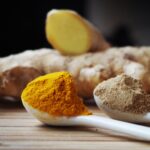Turmeric | The Inflammation Busting Powerhouse
Turmeric
Curcuma longa Turmeric is part of the ginger family and is native to Southeast Asia, mainly India. It has been used in Ayurveda and other forms of traditional medicine for centuries. It is also a popular ingredient in cooking and is a major ingredient in curry powder.
Curcumin is the active ingredient in turmeric. And it not only gives turmeric its yellow color but also gives it medicinal properties. However, there is only about 3% curcumin in turmeric, so for medicinal purposes, turmeric extract is a better alternative.
This plant species has phytochemicals and minerals which offer several biological activities. These include anti-inflammatory, antioxidant, anticancer, antimutagenic, antimicrobial, anti-obesity, hypolipidemic, cardioprotective, and neuroprotective effects.
One problem with turmeric is that curcumin is relatively unstable. This means that it degrades quickly when formulated which reduces the amount of active ingredient that reaches the bloodstream.
But, pairing turmeric with black pepper can help.
Black pepper’s active ingredient is piperine. Piperine enhances the absorption of curcumin by 2000%.
Medicinal Uses
Chronic Inflammation
Curcumin is a potent anti-inflammatory agent. Many diseases are associated with long-term inflammation and focusing on decreasing it may reduce the risks of developing diseases. Cancer, heart disease, and Alzheimer’s disease are just a few chronic diseases attributed to inflammation.
Heart Disease
Heart disease is a complex disease with several contributing factors. So curcumin is by no means a cure for this devastating illness. There is some evidence that indicates curcumin might have a positive impact on it.
The main benefit of curcumin regarding heart disease is its effect on improving endothelial function. In the study, damaging oxidative stress was reduced and oxygen that was able to get to the heart was increased.
Other studies have suggested that curcumin may improve heart health in post-menopausal women.
Anti Cancer
Curcumin is beneficial in the treatment of many types of cancer and affects cancer growth and development. Curcumin may contribute to cell death, reduce the growth of new blood vessels in tumors, and reduce metastasis.
Alzheimer’s Disease
The hallmark of diagnosing Alzheimer’s disease is a build-up of amyloid plaques. These are thought to play a major role in why the brain ends up degenerating with this terrible disease. Curcumin shows some benefits to clearing these plaques. It still needs further studies in humans.
Arthritis
Curcumin is a potent anti-inflammatory compound that has been shown to improve the symptoms of arthritis.
Other medicinal plants that may help with arthritis are Arnica, Angelica, Ashwagandha, Balsam Poplar, Basil, Black Cohosh, Borage, and Cinquefoil.
Try this all natural arthritis cream that uses 9 essential oils and is recommended by The Doctors and featured on major networks. Click here.
Other Uses
Wound healing and cleaning, chronic stress-induced disorders, depression, high cholesterol, some types of liver disease, and hay fever.
Potential Side Effects
Turmeric is safe to use for up to 3 months at a time. Some people have mild side effects, like GI upset, nausea, dizziness, or diarrhea. Avoid large amounts during pregnancy or breastfeeding. People with gallbladder problems, bleeding problems, hormone-sensitive conditions, infertility, liver disease, or who are scheduled to have surgery should not take turmeric.
